安徽省2021年中考英语语法专题突破二代 词(共55张PPT)
文档属性
| 名称 | 安徽省2021年中考英语语法专题突破二代 词(共55张PPT) |  | |
| 格式 | zip | ||
| 文件大小 | 802.5KB | ||
| 资源类型 | 教案 | ||
| 版本资源 | 通用版 | ||
| 科目 | 英语 | ||
| 更新时间 | 2020-12-27 12:49:09 | ||
图片预览


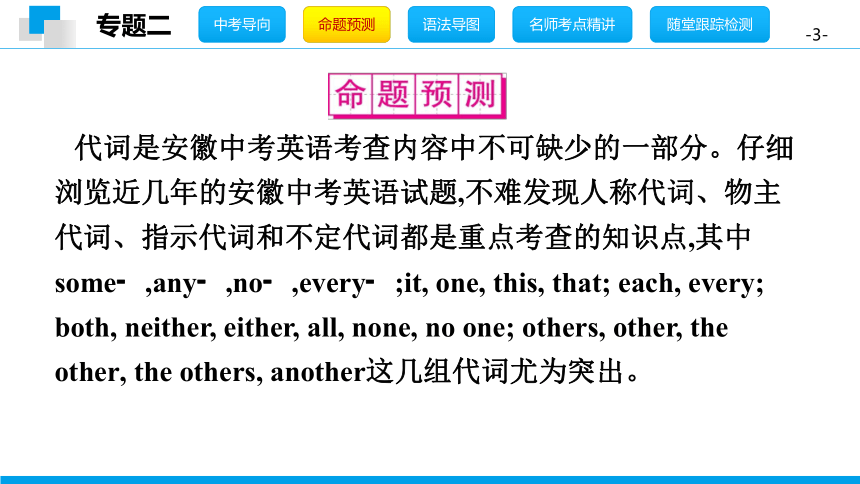
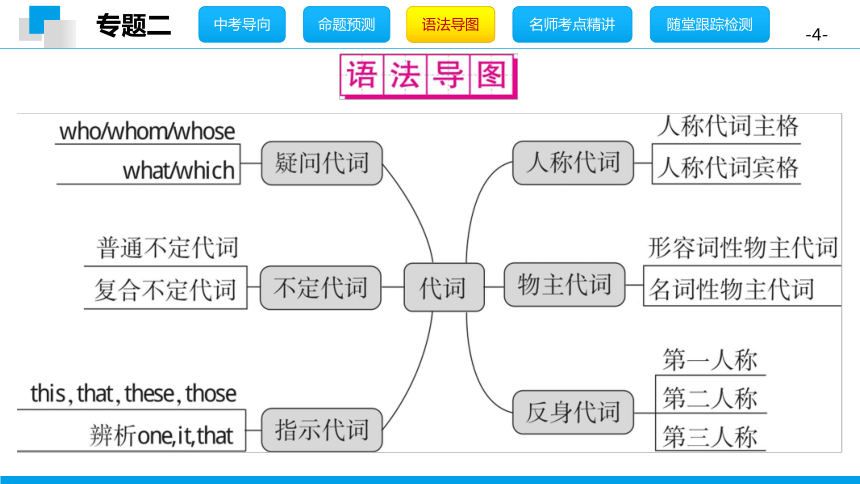

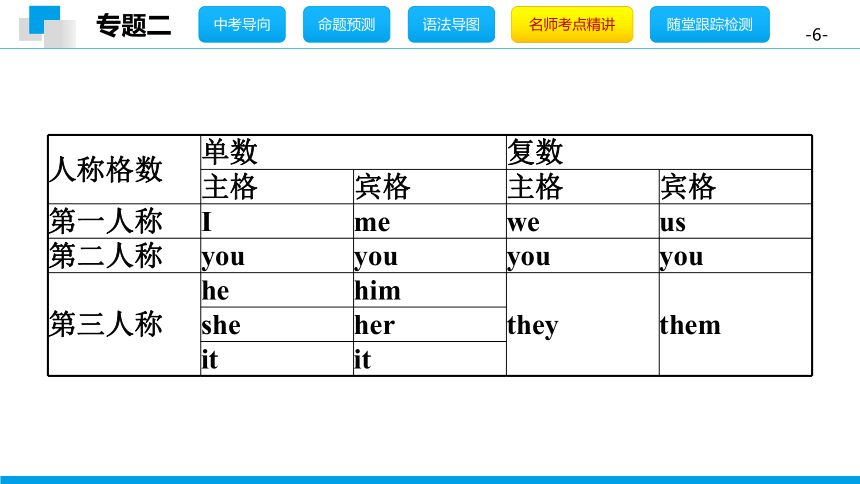

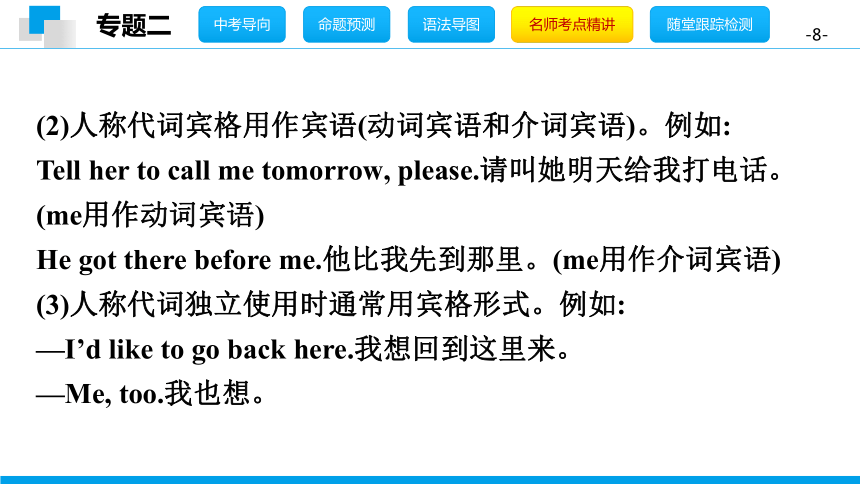
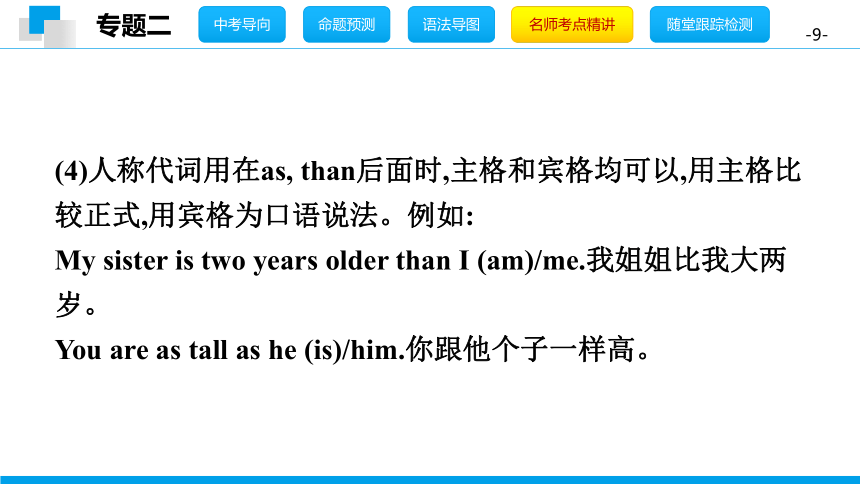
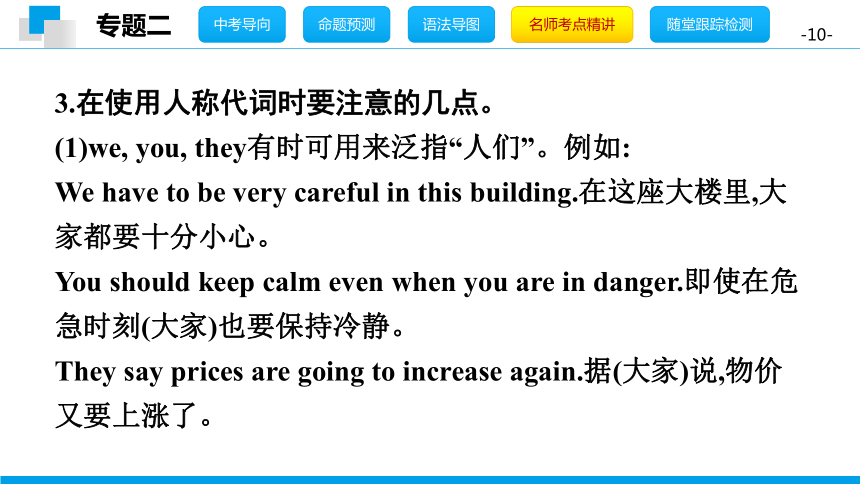

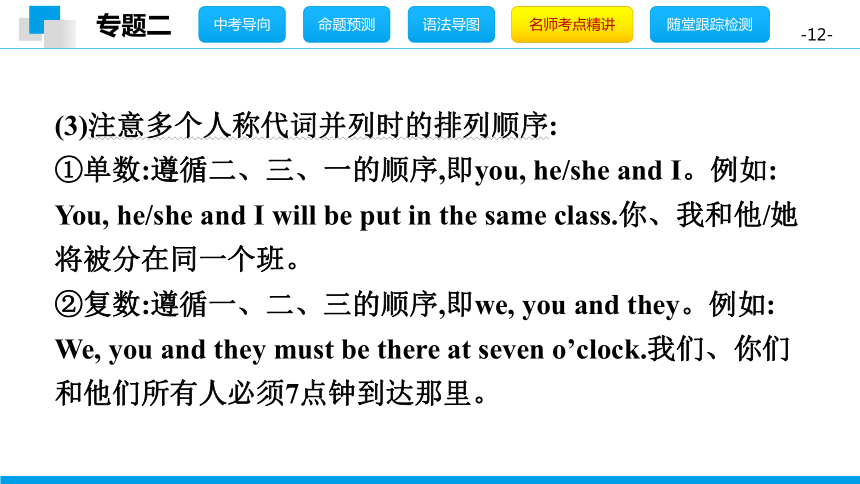
文档简介
(共55张PPT)
专题二 代 词
1.人称代词的主格和宾格;
2.形容词性物主代词和名词性物主代词的用法;
3.反身代词的用法;
4.指示代词的用法;
5.常见不定代词的用法;
6.疑问代词的用法。
代词是安徽中考英语考查内容中不可缺少的一部分。仔细浏览近几年的安徽中考英语试题,不难发现人称代词、物主代词、指示代词和不定代词都是重点考查的知识点,其中some?,any?,no?,every?;it,
one,
this,
that;
each,
every;
both,
neither,
either,
all,
none,
no
one;
others,
other,
the
other,
the
others,
another这几组代词尤为突出。
考点1 人称代词
1.人称代词是用来指代人或物的代词。
人称代词有人称(第一人称、第二人称、第三人称)、单复数及性别之分。根据人称代词在句中所充当的成分,可以分为主格人称代词和宾格人称代词。
人称格数
单数
复数
主格
宾格
主格
宾格
第一人称
I
me
we
us
第二人称
you
you
you
you
第三人称
he
him
they
them
she
her
it
it
2.人称代词的基本用法。
(1)人称代词主格用作主语或表语。例如:
If
he
writes
to
you,you
must
write
back.如果他给你写信,你必须回复。(he用作主语)
—Who
is
it?是谁呀?
—It’s
me.是我。(me用作表语)
注意:在口语中,人称代词如果作表语,通常用宾格形式。
(2)人称代词宾格用作宾语(动词宾语和介词宾语)。例如:
Tell
her
to
call
me
tomorrow,
please.请叫她明天给我打电话。(me用作动词宾语)
He
got
there
before
me.他比我先到那里。(me用作介词宾语)
(3)人称代词独立使用时通常用宾格形式。例如:
—I’d
like
to
go
back
here.我想回到这里来。
—Me,
too.我也想。
(4)人称代词用在as,
than后面时,主格和宾格均可以,用主格比较正式,用宾格为口语说法。例如:
My
sister
is
two
years
older
than
I
(am)/me.我姐姐比我大两岁。
You
are
as
tall
as
he
(is)/him.你跟他个子一样高。
3.在使用人称代词时要注意的几点。
(1)we,
you,
they有时可用来泛指“人们”。例如:
We
have
to
be
very
careful
in
this
building.在这座大楼里,大家都要十分小心。
You
should
keep
calm
even
when
you
are
in
danger.即使在危急时刻(大家)也要保持冷静。
They
say
prices
are
going
to
increase
again.据(大家)说,物价又要上涨了。
(2)she
可以用来代表国家、船只、大地、月亮等。例如:
China
will
always
do
what
she
has
promised
to
do.中国一直恪守承诺。
The
Titanic
was
on
her
first
voyage
when
she
sank.泰坦尼克号巨轮是在首航途中沉没的。
(3)注意多个人称代词并列时的排列顺序:
①单数:遵循二、三、一的顺序,即you,
he/she
and
I。例如:
You,
he/she
and
I
will
be
put
in
the
same
class.你、我和他/她将被分在同一个班。
②复数:遵循一、二、三的顺序,即we,
you
and
they。例如:
We,
you
and
they
must
be
there
at
seven
o’clock.我们、你们和他们所有人必须7点钟到达那里。
4.it的用法。
(1)it
可以指代时间、环境、季节、天气和距离等。例如:?
It’s
time
for
school.上学时间到了。
It
was
raining
this
morning.今天上午一直在下雨。
(2)it还可以指代身份不明的人或不确定性别的婴儿。例如:
—Someone
is
knocking
at
the
door.
Tom,
who
can
it
be?有人在敲门。汤姆,会是谁呢?
—It
must
be
Li
Lei.
He
is
going
to
my
home
this
afternoon.一定是李雷。他今天下午要来我家。
Is
it
a
boy
or
a
girl?是男孩还是女孩?
(3)it可以用作形式主语或形式宾语。
it
作形式主语常用于以下句型:
①It
takes
(sb.)+一段时间+to
do
sth.做某事花费(某人)多长时间
②It’s+adj.(+for/of
sb.)+to
do
sth.做某事(对某人来说)是……的/(某人)做某事真是太……了
③It’s+n./adj.+doing
sth.做某事是……
④It’s+n./adj.+that从句
……是……
(4)it用于“It
is/was...that/who...”强调句中。例如:?
It
was
yesterday
that
I
saw
her.我是昨天看到她的。
考点2 物主代词
1.表示所有关系的代词叫作物主代词。物主代词分形容词性物主代词和名词性物主代词两种,其人称和数的变化见下表:
类别人称数
单数
复数
第一
人称
第二
人称
第三人称
第一
人称
第二
人称
第三
人称
形容词性
物主代词
my
your
his
her
its
our
your
their
名词性
物主代词
mine
yours
his
hers
its
ours
yours
theirs
2.形容词性物主代词具有形容词的性质,可用在名词前作定语;名词性物主代词具有名词的性质,后面不再接名词,在句中可以充当主语、宾语和表语。例如:
My
book
is
new,and
yours
is
old.我的书是新的,你的书是旧的。(yours作主语)
My
pen
is
lost.Can
I
use
yours?我的钢笔丢了。我可以用你的吗?(yours作宾语)
This
is
my
pen.That’s
yours.这是我的钢笔。那是你的。(yours作表语)
考点3 反身代词
1.反身代词是一种表示反射或强调的代词。它的基本含义:通过反身代词指代主语,使施动者把动作在形式上反射到自己身上。因此,反身代词与它所指代的名词或代词形成互指关系,在人称、性别和数上保持一致。
数
人称
单数
复数
第一人称
myself
ourselves
第二人称
yourself
yourselves
第三人称
himself/herself/itself
themselves
2.常与反身代词连用的动词有enjoy,
dress,
hurt,
help,
teach等;常与反身代词连用的介词有by,
in,
for,
of等。例如:
enjoy
oneself玩得开心 hurt
oneself伤害自己
dress
oneself自己穿衣
help
oneself
to
sth.随便吃点某物
teach
oneself
sth.=learn
sth.by
oneself自学某事
by
oneself=on
one’s
own独自
look
after
oneself照顾自己
say
to
oneself自言自语
for
oneself为了某人自己
come
to
oneself苏醒过来
考点4 指示代词
1.常见指示代词分为单数(this,
that)和复数(these,
those)两种形式。
2.常见指示代词的用法。
(1)this,
these用于近指或指下文要提到的事。例如:
Please
remember
this:“No
pains,
no
gains.”
请记住这句话:“不劳无获。”
(2)that,
those用于远指或指上文刚刚提到过的事。例如:
Those
are
their
cars.那些是他们的车。
She’s
very
friendly,
and
that
is
why
we
all
love
her.她很友善,这就是我们都喜欢她的原因。
(3)打电话时,用this指代说话的一方,用that指代接听的一方。例如:
This
is
Mike
speaking.
Who
is
that?我是迈克。你是哪位?
3.one,it和that这三个常考易混词的用法如下:
代词
用法
例句
one
one泛指上文提及的同一类事物中的任意一个,相当于“a(n)+可数名词单数”。one既可指人,也可以指物。
Dad,
my
pen
is
very
old.
Can
you
buy
me
a
new
one?
爸爸,我的钢笔很旧了。你能给我买一支新的(钢笔)吗?
it
it用来指特定的事物,即上文提到的同一事物。it既可指代单数可数名词,也可指代不可数名词,或前面提到的事件或情况。
—My
father
bought
a
new
pen
for
me.我的爸爸给我买了一支新的钢笔。
—Could
you
lend
it
to
me?你能把它(指上文提到的钢笔)借给我吗?
that
that常用于比较结构中,指代前面提到的单数可数名词或不可数名词(具有特指性质,相当于“the+单数可数名词或不可数名词”),以避免重复。that只能指物,不能指人。
The
population
of
Shanghai
is
larger
than
that
of
Beijing.上海的人口数量比北京的(人口数量)多。
考点5 普通不定代词
不定代词是不明确指代任何特定名词或形容词的代词。常见的普通不定代词有some,
any,
every,
each,
all,
both,
much,
many,
(a)
little,
(a)
few,
other(s),
another,
none,
one,
either,
neither等。
下面是几组易混淆不定代词的辨析。
1.many,much,(a)
few和(a)
little
many(很多),few(几乎没有),a
few(有几个)用来指代或修饰可数名词;much(很多),little(几乎没有),a
little(有一点)用来指代或修饰不可数名词。具体归纳如下表:
用法
意义
指代或修饰可数名词
指代或修饰不可数名词
肯定意义
many,a
few
much,a
little
否定意义
few
little
例如:
—Do
you
have
any
water?你有水吗?
—Yes,
but
only
a
little.有,但只有一点儿。
Although
he
is
wealthy,
he
spends
little
on
clothes.尽管他很富有,但却花很少钱在衣服上。
He
has
many
friends,
but
few
are
true
friends/but
only
a
few
are
true
friends.他有很多朋友,却没几个真正的朋友/却只有几个真正的朋友。
2.another,other,the
other,others和the
others
词汇
用法
例句
another
作代词时,泛指“(三者或三者以上中的)另一个”。作形容词时,表示“又一个,再一个”,其后通常接可数名词单数。注意:another+数词+可数名词复数=数词+more+可数名词复数。
I
don’t
like
this
one.
Please
show
me
another.我不喜欢这个。请给我看另一个。
Would
you
like
another
apple?你要再来一个苹果吗?
other
作形容词,意为“其他的;别的”,通常作定语,其后接可数名词复数。
English
is
spoken
in
England,
the
US,
Canada
and
many
other
countries.英国、美国、加拿大以及其他很多国家的人都说英语。
the
other
特指“(两者中的)另一个”,常用于one...the
other...结构中,表示“一个……,另一个……”。
Jim
has
two
close
friends.
One
is
Jane,
and
the
other
is
Tim.吉姆有两个好朋友。一个是简,另外一个是蒂姆。
others
作代词,相当于“other+复数名词”,意为“另外的、其他的人或物”,表泛指。常和some连用,构成some...others...结构。
In
the
garden,some
are
carrying
water,and
others
are
watering
the
flowers.花园里一些人在提水,另一些人在浇花。
the
others
作代词,意为“其他的东西;其余的人”,指代在某个范围内的所有剩余的人或物,后面不再接名词。
Five
of
them
are
in
the
classroom.
What
about
the
others?他们中只有五个人在教室里,其余的人呢?
3.both,all,either,neither,none和no
one
代词
用法
例句
both
指“两者都”;both...and...“……和……都”,连接两个并列的成分作主语时,谓语动词用复数形式。
Both
his
eyes
are
hurt.他的两只眼睛都受伤了。
all
指“(三者或三者以上)都”,在句中作主语时,谓语动词的单复数形式受其后名词的影响。常与of
连用,而且要与人称代词宾格us,you,them等连用,如all
of
us等。
All
the
flowers
are
gone.所有的花都谢了。
All
of
us
like
to
eat
potato
chips.我们都喜欢吃薯片。
either
指“(两者中的)任意一个”,作主语时,谓语动词用单数形式;either...or...“或者……或者……”,连接并列成分作主语时,谓语动词遵循“就近原则”。
—Which
would
you
like,tea
or
coffee?你想喝点什么,茶还是咖啡?
—Either
is
OK.I
don’t
care.都可以。我不介意。
neither
指“两者都不”,表否定含义,作主语时,谓语动词一般用单数形式;neither...or...“既不……也不……”,连接并列成分作主语时,谓语动词遵循“就近原则”。
Neither
of
them
comes
from
the
USA.他们两个都不是来自美国。
none
代指可数名词时,表示“(三者或三者以上)一个也没有”,作主语时,谓语动词可以用单数形式,也可以用复数形式;代指不可数名词且作主语时,谓语动词用单数形式。可与of连用。none在实际运用中多指代上文提到的人或物,往往表示特指,用于回答由how
many/how
much/is
there/are
there
等引起的疑问句中。
None
of
them
comes/come
from
the
countryside.他们当中没有一个人来自乡下。
He
told
me
all
the
news,
but
none
of
it
was
exciting.他把所有的消息都告诉了我,但都不令人兴奋。
no
one
只能指人,表示“没有一个人”,一般用来回答由who引起的特殊疑问句。不可与of连用。
—Who
went
to
the
museum?谁去了博物馆?
—No
one.没人去。
4.some和any
代词
用法
例句
some
表示“一些”,一般用于肯定句中,也可用于表达请求或建议的疑问句中,表示希望得到对方的肯定回答。既可以指代不可数名词,也可以指代可数名词复数。
I
have
no
paper.
Please
give
me
some.我没有纸了。请给我一些。
The
flowers
are
beautiful.
Why
don’t
you
buy
her
some?这些花很漂亮。为什么不给她买些呢?
any
表示“一些”,常用于条件状语从句、否定句或疑问句中。既可以指代不可数名词,也可以指代可数名词复数。
He
had
a
lot
of
music
CDs.
Did
he
lend
you
any?他有很多音乐光盘。他借给你一些了吗?
5.each和every
词汇
用法
例句
each
强调个体,指两个或两个以上的人或物中的“每一个”,用作限定词或代词,可与of连用,也可单独使用。
Each
of
his
children
goes
to
a
different
school.他的每个孩子都在不同的学校读书。
every
强调整体,指三个或三个以上的人或物中的“每一个”,仅用作定语,其后不可加of,也不可单独使用。
Every
man
can
be
a
great
cook.每个人都能成为一名优秀的厨师。
考点6 复合不定代词
初中常见的复合不定代词:
somebody
某人
anybody
任何人
nobody
没人
everybody
每个人
someone
某人
anyone
任何人
no
one
没人
everyone
每个人
something
某事
anything
任何事
nothing
没有东西/事情
everything
每件事
somewhere
某地
anywhere
任何地方
nowhere
无处
everywhere
每个地方
一般来讲复合不定代词用作主语时,谓语动词用单数形式,其中somebody,
someone,
something
和
somewhere通常用在肯定句中;anybody,
anyone,
anything和anywhere
通常用在疑问句和否定句中;nobody,
no
one,
nothing
和
nowhere
表示否定意义;everybody,
everyone,
everything
和
everywhere通常用在肯定句、疑问句或否定句中。例如:
Mr.
Brown
has
something
in
common
with
his
wife
in
many
ways.布朗先生和他的妻子在很多方面有相似之处。
Is
there
anything
interesting
in
today’s
newspaper?今天的报纸上有什么有趣的事吗?
There
is
nothing
wrong
with
the
machine.这台机器没什么毛病。
Not
everyone
can
work
out
the
problem.不是所有人都能算出这道题。
We
can
do
nothing
but
accept
it.除了接受它我们什么也做不了。
考点7 疑问代词
1.常见疑问代词
疑问代词
含义
基本用法
what
什么
对具体内容进行提问(询问事物、身份、职业等)
who
谁
询问人物、身份,可作主语、宾语和表语
whom
谁
询问人物、身份,只作宾语
whose
谁的
询问所属关系
which
哪一个
对指定范围内的“哪一个”进行提问(询问特定的人或物)
2.常与疑问代词混合考查的疑问副词
疑问副词
含义
基本用法
when
什么时候
对时间进行提问(询问时间点、日期、年份等)
where
哪里
对地点进行提问
why
为什么
对原因进行提问
how
怎样
对方式、健康状况、程度等进行提问
3.疑问代词常见句型
(1)What
do
you
think
of...?“你认为……怎么样?”用于询问对方的看法。
(2)What
would
you
like
to...?“你想……?”用于询问对方的意见。
(3)What
is
sb.?/What
does
sb.do?“某人是做什么的?”用于询问某人的职业。
(4)What
is
the
weather
like?/How
is
the
weather?“天气如何?”用于询问天气状况。
(5)What
does
sb.
look
like?“某人长什么样?”用于询问某人的外貌特征。
(6)What
is
sb.like?“某人怎么样?”用于询问某人是什么样的人(性格方面)。
单项填空
1.—They
are
too
busy
to
help
us
finish
the
work.
—Let’s
do
it
.(
C
)?
A.herself
B.myself
C.ourselves
D.itself
2. needs
one
or
two
close
friends
to
share
his
happiness
and
sadness
with.(
D
)?
A.Someone
B.No
one
C.None
D.Everyone
3.—
skirt
is
more
beautiful
than
yours??
—Lily’s.(
B
)
A.Which
B.Whose
C.Who
D.What
4.—Where
would
you
like
to
go
for
your
summer
holiday,Beijing
or
Shanghai?
— .I
will
go
to
Sanya
in
Hainan.(
C
)?
A.Both
B.Each
C.Neither
D.Either
5.—Don’t
be
angry
with
your
kid
when
he
makes
a
mistake
again,
will
you?
—No,
I
won’t.I
know
that of
us
are
perfect
after
all.
(
A
)?
A.none
B.neither
C.each
D.all
6.You
could
play
with
the
sad
girl
and
cheer
up.
(
B
)?
A.him
B.her
C.them
D.you
7.—I
need
something
for
cutting
the
paper.
—Oh,
you
want
a
knife?
OK,
I’ll
get
for
you.
(
D
)?
A.it
B.that
C.this
D.one
8.—I
have
two
soccer
balls.
What
about
you?
—Oh,I
don’t
have .(
C
)?
A.some
B.little
C.any
D.much
9.He
found
very
difficult
to
get
to
sleep.So
he
decided
to
read
a
book.(
D
)?
A.this
B.that
C.its
D.it
10.
of
us
know
what
has
happened
in
that
place.It
is
no
use
asking
us
such
a
question.(
A
)?
A.Few
B.A
few
C.Little
D.A
little
11.—Who
was
hurt
in
the
traffic
accident?
— .(
B
)?
A.None
B.No
one
C.Nothing
D.Neither
12.—Sir, called
you
just
now.
I
told
him
to
phone
again
20
minutes
later.?
—OK.Thanks,Nancy.(
A
)
A.someone
B.nobody
C.anyone
D.everyone
13.—Where
are
my
books?
—Oh,
sorry.
I
have
taken
by
mistake.(
D
)?
A.hers
B.his
C.mine
D.yours
14.—Have
you
brought
with
you?
We
won’t
have
time
to
come
back.?
—Don’t
worry.
All
the
things
we
need
are
here,
in
this
big
bag.(
D
)
A.something
B.anything
C.nothing
D.everything
15.Your
hometown
is
really
nice!
The
weather
is
as
good
as of
Kunming.(
B
)?
A.these
B.that
C.This
D.those
16.Some
people
like
to
stay
at
home,
but
like
to
go
to
the
park.(
C
)?
A.Another
B.other
C.others
D.other
one
专题二 代 词
1.人称代词的主格和宾格;
2.形容词性物主代词和名词性物主代词的用法;
3.反身代词的用法;
4.指示代词的用法;
5.常见不定代词的用法;
6.疑问代词的用法。
代词是安徽中考英语考查内容中不可缺少的一部分。仔细浏览近几年的安徽中考英语试题,不难发现人称代词、物主代词、指示代词和不定代词都是重点考查的知识点,其中some?,any?,no?,every?;it,
one,
this,
that;
each,
every;
both,
neither,
either,
all,
none,
no
one;
others,
other,
the
other,
the
others,
another这几组代词尤为突出。
考点1 人称代词
1.人称代词是用来指代人或物的代词。
人称代词有人称(第一人称、第二人称、第三人称)、单复数及性别之分。根据人称代词在句中所充当的成分,可以分为主格人称代词和宾格人称代词。
人称格数
单数
复数
主格
宾格
主格
宾格
第一人称
I
me
we
us
第二人称
you
you
you
you
第三人称
he
him
they
them
she
her
it
it
2.人称代词的基本用法。
(1)人称代词主格用作主语或表语。例如:
If
he
writes
to
you,you
must
write
back.如果他给你写信,你必须回复。(he用作主语)
—Who
is
it?是谁呀?
—It’s
me.是我。(me用作表语)
注意:在口语中,人称代词如果作表语,通常用宾格形式。
(2)人称代词宾格用作宾语(动词宾语和介词宾语)。例如:
Tell
her
to
call
me
tomorrow,
please.请叫她明天给我打电话。(me用作动词宾语)
He
got
there
before
me.他比我先到那里。(me用作介词宾语)
(3)人称代词独立使用时通常用宾格形式。例如:
—I’d
like
to
go
back
here.我想回到这里来。
—Me,
too.我也想。
(4)人称代词用在as,
than后面时,主格和宾格均可以,用主格比较正式,用宾格为口语说法。例如:
My
sister
is
two
years
older
than
I
(am)/me.我姐姐比我大两岁。
You
are
as
tall
as
he
(is)/him.你跟他个子一样高。
3.在使用人称代词时要注意的几点。
(1)we,
you,
they有时可用来泛指“人们”。例如:
We
have
to
be
very
careful
in
this
building.在这座大楼里,大家都要十分小心。
You
should
keep
calm
even
when
you
are
in
danger.即使在危急时刻(大家)也要保持冷静。
They
say
prices
are
going
to
increase
again.据(大家)说,物价又要上涨了。
(2)she
可以用来代表国家、船只、大地、月亮等。例如:
China
will
always
do
what
she
has
promised
to
do.中国一直恪守承诺。
The
Titanic
was
on
her
first
voyage
when
she
sank.泰坦尼克号巨轮是在首航途中沉没的。
(3)注意多个人称代词并列时的排列顺序:
①单数:遵循二、三、一的顺序,即you,
he/she
and
I。例如:
You,
he/she
and
I
will
be
put
in
the
same
class.你、我和他/她将被分在同一个班。
②复数:遵循一、二、三的顺序,即we,
you
and
they。例如:
We,
you
and
they
must
be
there
at
seven
o’clock.我们、你们和他们所有人必须7点钟到达那里。
4.it的用法。
(1)it
可以指代时间、环境、季节、天气和距离等。例如:?
It’s
time
for
school.上学时间到了。
It
was
raining
this
morning.今天上午一直在下雨。
(2)it还可以指代身份不明的人或不确定性别的婴儿。例如:
—Someone
is
knocking
at
the
door.
Tom,
who
can
it
be?有人在敲门。汤姆,会是谁呢?
—It
must
be
Li
Lei.
He
is
going
to
my
home
this
afternoon.一定是李雷。他今天下午要来我家。
Is
it
a
boy
or
a
girl?是男孩还是女孩?
(3)it可以用作形式主语或形式宾语。
it
作形式主语常用于以下句型:
①It
takes
(sb.)+一段时间+to
do
sth.做某事花费(某人)多长时间
②It’s+adj.(+for/of
sb.)+to
do
sth.做某事(对某人来说)是……的/(某人)做某事真是太……了
③It’s+n./adj.+doing
sth.做某事是……
④It’s+n./adj.+that从句
……是……
(4)it用于“It
is/was...that/who...”强调句中。例如:?
It
was
yesterday
that
I
saw
her.我是昨天看到她的。
考点2 物主代词
1.表示所有关系的代词叫作物主代词。物主代词分形容词性物主代词和名词性物主代词两种,其人称和数的变化见下表:
类别人称数
单数
复数
第一
人称
第二
人称
第三人称
第一
人称
第二
人称
第三
人称
形容词性
物主代词
my
your
his
her
its
our
your
their
名词性
物主代词
mine
yours
his
hers
its
ours
yours
theirs
2.形容词性物主代词具有形容词的性质,可用在名词前作定语;名词性物主代词具有名词的性质,后面不再接名词,在句中可以充当主语、宾语和表语。例如:
My
book
is
new,and
yours
is
old.我的书是新的,你的书是旧的。(yours作主语)
My
pen
is
lost.Can
I
use
yours?我的钢笔丢了。我可以用你的吗?(yours作宾语)
This
is
my
pen.That’s
yours.这是我的钢笔。那是你的。(yours作表语)
考点3 反身代词
1.反身代词是一种表示反射或强调的代词。它的基本含义:通过反身代词指代主语,使施动者把动作在形式上反射到自己身上。因此,反身代词与它所指代的名词或代词形成互指关系,在人称、性别和数上保持一致。
数
人称
单数
复数
第一人称
myself
ourselves
第二人称
yourself
yourselves
第三人称
himself/herself/itself
themselves
2.常与反身代词连用的动词有enjoy,
dress,
hurt,
help,
teach等;常与反身代词连用的介词有by,
in,
for,
of等。例如:
enjoy
oneself玩得开心 hurt
oneself伤害自己
dress
oneself自己穿衣
help
oneself
to
sth.随便吃点某物
teach
oneself
sth.=learn
sth.by
oneself自学某事
by
oneself=on
one’s
own独自
look
after
oneself照顾自己
say
to
oneself自言自语
for
oneself为了某人自己
come
to
oneself苏醒过来
考点4 指示代词
1.常见指示代词分为单数(this,
that)和复数(these,
those)两种形式。
2.常见指示代词的用法。
(1)this,
these用于近指或指下文要提到的事。例如:
Please
remember
this:“No
pains,
no
gains.”
请记住这句话:“不劳无获。”
(2)that,
those用于远指或指上文刚刚提到过的事。例如:
Those
are
their
cars.那些是他们的车。
She’s
very
friendly,
and
that
is
why
we
all
love
her.她很友善,这就是我们都喜欢她的原因。
(3)打电话时,用this指代说话的一方,用that指代接听的一方。例如:
This
is
Mike
speaking.
Who
is
that?我是迈克。你是哪位?
3.one,it和that这三个常考易混词的用法如下:
代词
用法
例句
one
one泛指上文提及的同一类事物中的任意一个,相当于“a(n)+可数名词单数”。one既可指人,也可以指物。
Dad,
my
pen
is
very
old.
Can
you
buy
me
a
new
one?
爸爸,我的钢笔很旧了。你能给我买一支新的(钢笔)吗?
it
it用来指特定的事物,即上文提到的同一事物。it既可指代单数可数名词,也可指代不可数名词,或前面提到的事件或情况。
—My
father
bought
a
new
pen
for
me.我的爸爸给我买了一支新的钢笔。
—Could
you
lend
it
to
me?你能把它(指上文提到的钢笔)借给我吗?
that
that常用于比较结构中,指代前面提到的单数可数名词或不可数名词(具有特指性质,相当于“the+单数可数名词或不可数名词”),以避免重复。that只能指物,不能指人。
The
population
of
Shanghai
is
larger
than
that
of
Beijing.上海的人口数量比北京的(人口数量)多。
考点5 普通不定代词
不定代词是不明确指代任何特定名词或形容词的代词。常见的普通不定代词有some,
any,
every,
each,
all,
both,
much,
many,
(a)
little,
(a)
few,
other(s),
another,
none,
one,
either,
neither等。
下面是几组易混淆不定代词的辨析。
1.many,much,(a)
few和(a)
little
many(很多),few(几乎没有),a
few(有几个)用来指代或修饰可数名词;much(很多),little(几乎没有),a
little(有一点)用来指代或修饰不可数名词。具体归纳如下表:
用法
意义
指代或修饰可数名词
指代或修饰不可数名词
肯定意义
many,a
few
much,a
little
否定意义
few
little
例如:
—Do
you
have
any
water?你有水吗?
—Yes,
but
only
a
little.有,但只有一点儿。
Although
he
is
wealthy,
he
spends
little
on
clothes.尽管他很富有,但却花很少钱在衣服上。
He
has
many
friends,
but
few
are
true
friends/but
only
a
few
are
true
friends.他有很多朋友,却没几个真正的朋友/却只有几个真正的朋友。
2.another,other,the
other,others和the
others
词汇
用法
例句
another
作代词时,泛指“(三者或三者以上中的)另一个”。作形容词时,表示“又一个,再一个”,其后通常接可数名词单数。注意:another+数词+可数名词复数=数词+more+可数名词复数。
I
don’t
like
this
one.
Please
show
me
another.我不喜欢这个。请给我看另一个。
Would
you
like
another
apple?你要再来一个苹果吗?
other
作形容词,意为“其他的;别的”,通常作定语,其后接可数名词复数。
English
is
spoken
in
England,
the
US,
Canada
and
many
other
countries.英国、美国、加拿大以及其他很多国家的人都说英语。
the
other
特指“(两者中的)另一个”,常用于one...the
other...结构中,表示“一个……,另一个……”。
Jim
has
two
close
friends.
One
is
Jane,
and
the
other
is
Tim.吉姆有两个好朋友。一个是简,另外一个是蒂姆。
others
作代词,相当于“other+复数名词”,意为“另外的、其他的人或物”,表泛指。常和some连用,构成some...others...结构。
In
the
garden,some
are
carrying
water,and
others
are
watering
the
flowers.花园里一些人在提水,另一些人在浇花。
the
others
作代词,意为“其他的东西;其余的人”,指代在某个范围内的所有剩余的人或物,后面不再接名词。
Five
of
them
are
in
the
classroom.
What
about
the
others?他们中只有五个人在教室里,其余的人呢?
3.both,all,either,neither,none和no
one
代词
用法
例句
both
指“两者都”;both...and...“……和……都”,连接两个并列的成分作主语时,谓语动词用复数形式。
Both
his
eyes
are
hurt.他的两只眼睛都受伤了。
all
指“(三者或三者以上)都”,在句中作主语时,谓语动词的单复数形式受其后名词的影响。常与of
连用,而且要与人称代词宾格us,you,them等连用,如all
of
us等。
All
the
flowers
are
gone.所有的花都谢了。
All
of
us
like
to
eat
potato
chips.我们都喜欢吃薯片。
either
指“(两者中的)任意一个”,作主语时,谓语动词用单数形式;either...or...“或者……或者……”,连接并列成分作主语时,谓语动词遵循“就近原则”。
—Which
would
you
like,tea
or
coffee?你想喝点什么,茶还是咖啡?
—Either
is
OK.I
don’t
care.都可以。我不介意。
neither
指“两者都不”,表否定含义,作主语时,谓语动词一般用单数形式;neither...or...“既不……也不……”,连接并列成分作主语时,谓语动词遵循“就近原则”。
Neither
of
them
comes
from
the
USA.他们两个都不是来自美国。
none
代指可数名词时,表示“(三者或三者以上)一个也没有”,作主语时,谓语动词可以用单数形式,也可以用复数形式;代指不可数名词且作主语时,谓语动词用单数形式。可与of连用。none在实际运用中多指代上文提到的人或物,往往表示特指,用于回答由how
many/how
much/is
there/are
there
等引起的疑问句中。
None
of
them
comes/come
from
the
countryside.他们当中没有一个人来自乡下。
He
told
me
all
the
news,
but
none
of
it
was
exciting.他把所有的消息都告诉了我,但都不令人兴奋。
no
one
只能指人,表示“没有一个人”,一般用来回答由who引起的特殊疑问句。不可与of连用。
—Who
went
to
the
museum?谁去了博物馆?
—No
one.没人去。
4.some和any
代词
用法
例句
some
表示“一些”,一般用于肯定句中,也可用于表达请求或建议的疑问句中,表示希望得到对方的肯定回答。既可以指代不可数名词,也可以指代可数名词复数。
I
have
no
paper.
Please
give
me
some.我没有纸了。请给我一些。
The
flowers
are
beautiful.
Why
don’t
you
buy
her
some?这些花很漂亮。为什么不给她买些呢?
any
表示“一些”,常用于条件状语从句、否定句或疑问句中。既可以指代不可数名词,也可以指代可数名词复数。
He
had
a
lot
of
music
CDs.
Did
he
lend
you
any?他有很多音乐光盘。他借给你一些了吗?
5.each和every
词汇
用法
例句
each
强调个体,指两个或两个以上的人或物中的“每一个”,用作限定词或代词,可与of连用,也可单独使用。
Each
of
his
children
goes
to
a
different
school.他的每个孩子都在不同的学校读书。
every
强调整体,指三个或三个以上的人或物中的“每一个”,仅用作定语,其后不可加of,也不可单独使用。
Every
man
can
be
a
great
cook.每个人都能成为一名优秀的厨师。
考点6 复合不定代词
初中常见的复合不定代词:
somebody
某人
anybody
任何人
nobody
没人
everybody
每个人
someone
某人
anyone
任何人
no
one
没人
everyone
每个人
something
某事
anything
任何事
nothing
没有东西/事情
everything
每件事
somewhere
某地
anywhere
任何地方
nowhere
无处
everywhere
每个地方
一般来讲复合不定代词用作主语时,谓语动词用单数形式,其中somebody,
someone,
something
和
somewhere通常用在肯定句中;anybody,
anyone,
anything和anywhere
通常用在疑问句和否定句中;nobody,
no
one,
nothing
和
nowhere
表示否定意义;everybody,
everyone,
everything
和
everywhere通常用在肯定句、疑问句或否定句中。例如:
Mr.
Brown
has
something
in
common
with
his
wife
in
many
ways.布朗先生和他的妻子在很多方面有相似之处。
Is
there
anything
interesting
in
today’s
newspaper?今天的报纸上有什么有趣的事吗?
There
is
nothing
wrong
with
the
machine.这台机器没什么毛病。
Not
everyone
can
work
out
the
problem.不是所有人都能算出这道题。
We
can
do
nothing
but
accept
it.除了接受它我们什么也做不了。
考点7 疑问代词
1.常见疑问代词
疑问代词
含义
基本用法
what
什么
对具体内容进行提问(询问事物、身份、职业等)
who
谁
询问人物、身份,可作主语、宾语和表语
whom
谁
询问人物、身份,只作宾语
whose
谁的
询问所属关系
which
哪一个
对指定范围内的“哪一个”进行提问(询问特定的人或物)
2.常与疑问代词混合考查的疑问副词
疑问副词
含义
基本用法
when
什么时候
对时间进行提问(询问时间点、日期、年份等)
where
哪里
对地点进行提问
why
为什么
对原因进行提问
how
怎样
对方式、健康状况、程度等进行提问
3.疑问代词常见句型
(1)What
do
you
think
of...?“你认为……怎么样?”用于询问对方的看法。
(2)What
would
you
like
to...?“你想……?”用于询问对方的意见。
(3)What
is
sb.?/What
does
sb.do?“某人是做什么的?”用于询问某人的职业。
(4)What
is
the
weather
like?/How
is
the
weather?“天气如何?”用于询问天气状况。
(5)What
does
sb.
look
like?“某人长什么样?”用于询问某人的外貌特征。
(6)What
is
sb.like?“某人怎么样?”用于询问某人是什么样的人(性格方面)。
单项填空
1.—They
are
too
busy
to
help
us
finish
the
work.
—Let’s
do
it
.(
C
)?
A.herself
B.myself
C.ourselves
D.itself
2. needs
one
or
two
close
friends
to
share
his
happiness
and
sadness
with.(
D
)?
A.Someone
B.No
one
C.None
D.Everyone
3.—
skirt
is
more
beautiful
than
yours??
—Lily’s.(
B
)
A.Which
B.Whose
C.Who
D.What
4.—Where
would
you
like
to
go
for
your
summer
holiday,Beijing
or
Shanghai?
— .I
will
go
to
Sanya
in
Hainan.(
C
)?
A.Both
B.Each
C.Neither
D.Either
5.—Don’t
be
angry
with
your
kid
when
he
makes
a
mistake
again,
will
you?
—No,
I
won’t.I
know
that of
us
are
perfect
after
all.
(
A
)?
A.none
B.neither
C.each
D.all
6.You
could
play
with
the
sad
girl
and
cheer
up.
(
B
)?
A.him
B.her
C.them
D.you
7.—I
need
something
for
cutting
the
paper.
—Oh,
you
want
a
knife?
OK,
I’ll
get
for
you.
(
D
)?
A.it
B.that
C.this
D.one
8.—I
have
two
soccer
balls.
What
about
you?
—Oh,I
don’t
have .(
C
)?
A.some
B.little
C.any
D.much
9.He
found
very
difficult
to
get
to
sleep.So
he
decided
to
read
a
book.(
D
)?
A.this
B.that
C.its
D.it
10.
of
us
know
what
has
happened
in
that
place.It
is
no
use
asking
us
such
a
question.(
A
)?
A.Few
B.A
few
C.Little
D.A
little
11.—Who
was
hurt
in
the
traffic
accident?
— .(
B
)?
A.None
B.No
one
C.Nothing
D.Neither
12.—Sir, called
you
just
now.
I
told
him
to
phone
again
20
minutes
later.?
—OK.Thanks,Nancy.(
A
)
A.someone
B.nobody
C.anyone
D.everyone
13.—Where
are
my
books?
—Oh,
sorry.
I
have
taken
by
mistake.(
D
)?
A.hers
B.his
C.mine
D.yours
14.—Have
you
brought
with
you?
We
won’t
have
time
to
come
back.?
—Don’t
worry.
All
the
things
we
need
are
here,
in
this
big
bag.(
D
)
A.something
B.anything
C.nothing
D.everything
15.Your
hometown
is
really
nice!
The
weather
is
as
good
as of
Kunming.(
B
)?
A.these
B.that
C.This
D.those
16.Some
people
like
to
stay
at
home,
but
like
to
go
to
the
park.(
C
)?
A.Another
B.other
C.others
D.other
one
同课章节目录
- 词法
- 名词
- 动词和动词短语
- 动词语态
- 动词时态
- 助动词和情态动词
- 非谓语动词
- 冠词
- 代词
- 数词和量词
- 形容词副词及其比较等级
- 介词和介词短语
- 连词和感叹词
- 构词法
- 相似、相近词比较
- 句法
- 陈述句
- 一般疑问句和否定疑问句
- 特殊疑问句及选择疑问句
- 反意疑问句
- 存在句(There be句型)
- 宾语从句
- 定语从句
- 状语从句
- 主谓一致问题
- 简单句
- 并列句
- 复合句
- 主谓一致
- 主、表语从句
- 名词性从句
- 直接引语和间接引语
- 虚拟语气
- 感叹句
- 强调句
- 倒装句
- 祈使句
- 句子的成分
- 句子的分类
- 题型专区
- 单项选择部分
- 易错题
- 完形填空
- 阅读理解
- 词汇练习
- 听说训练
- 句型转换
- 补全对话
- 短文改错
- 翻译
- 书面表达
- 任务型阅读
- 语法填空
- 其他资料
